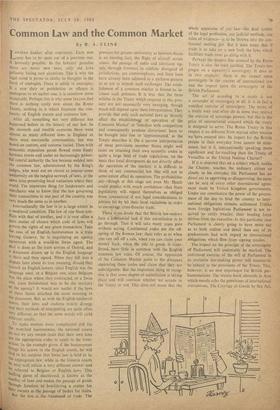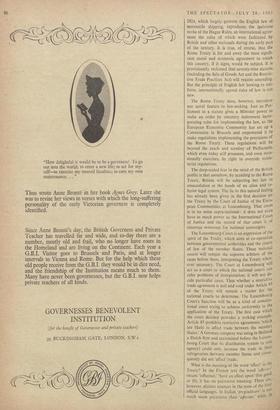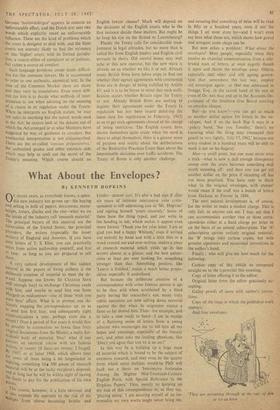Common Law and the Common Market
By R. A. CLINE
AWYERS hanker after continuity. Each new
case has to be spun out of a previous one, if humanly possible. In the lawyers' paradise there are never new laws, only old laws gallantly facing new situations. This is why the legal mind is prone to clothe its thoughts in the form of analogies. There is safety in analogies; if a new duty or prohibition or offence is analogous to an earlier one, it is somehow more acceptable. Perhaps this is why some lawyers feel there is nothing really new about the Rome Treaty, nothing in it which fractures the con- tinuity of English statute and common law.
After all, something not very different has happened before in the history of our law. In the eleventh and twelfth centuries there were almost as many different laws in England as there were mercantile communities; law was based on custom, and customs varied. Then with economic expansion goods flowed more freely between towns and under an increasingly power- ful central authority the law became welded into the common law, administered by the King's Judges, who went out on circuit to impose some uniformity on the tangled network of laws, at the same time preserving local variations where they Could. The important thing for landowners and merchants was to know that the law governing their transactions in one part of the country was very much the same as in another.
Internationally the law is to a large extent in a medizeval condition. The law of one State con- flicts with that of another, and it is very often a pure matter of chance which code of laws will govern the rights of any given transaction. Take the case of an English businessman in a train leaving Geneva; he is negotiating an agency agreement with a would-be Swiss agent. The deal is done as the train arrives at Ostend, and a document drawn up in the English language is there and then signed. When they fall into a dispute later about its true meaning, should they cOnsult an English lawyer, since English was the language used, or a Belgian one, since Belgium Was the place where they contracted, or a Swiss °rte, since Switzerland was to be the territory of the agency? It would not matter if the laws of these States attached the same meaning to the document. But, as with the English medireval towns, their laws and customs widely diverge and their methods of interpreting are quite often very different, so that the same words will yield (Efferent results.
To make matters more complicated still for the wretched businessman, the national courts do not by any means insist that their own laws are the appropriate codes to apply to the trans- action. In the example given, if the businessman brings his action in the English courts, he will End to his surprise that Swiss law is held to be the appropriate law, while in the Geneva courts , ',le may well obtain a very different answer and 1e referred to Belgian or English laws. This balking game of shuttlecock is known as the cc.nflict of laws and makes the passage of goods tihelirough frontiers as bewildering a matter for the' owners as the passage of bodies for theirs.
But the law.. is the handmaid of trade. The pressure for greater uniformity as between States is an existing fact; the flight of aircraft across coasts, the passage of radio and television sig- nals through frontiers in sublime disregard of jurisdictions, are commonplaces, and State laws have already been adjusted to a uniform pattern so as not to impede such exchanges. The estab- lishment of a common market is bound to in- crease such pressure. It is true that the three articles in the Treaty which respond to this pres- sure are not necessarily very sweeping, though much will depend upon their interpretation. They provide that only such national laws as 'directly affect the establishmeitt or operation of the Common Market' or 'interfere with competition and consequently produce distortions' have to be brought into line or 'approximated,' as the Treaty describes it. On a narrow interpretation of these provisions member States might well insist on retaining their own eccentric codes in quite a large field of trade regulations, on the basis that local divergences do not directly affect the operation of the market; it is difficult to think of any commercial law that will not to some extent affect its operation. The probabilities are-;--though at this stage not even Mr. Heath could predict with much confidence—that State legislatures will regard themselves as obliged from commercial if not legal considerations to jettison bit by bit their local variations in order to encourage cross-frontier trade.
There is.no doubt that the British law-makers face a substantial task if this assimilation is to go through. That it will take many years goes without saying. Continental codes are the off- spring of the Roman law; their rules as to when you can call off a sale, when you can claim your money back, when the title to goods is trans- ferred, have little in common with the English common law rules. Of course, the opponents of the Common Market point to the distances separating these codes and claim that they are unbridgeable. But the important thing to recog- nise is that some degree of assimilation is taking place and will continue whether we accede to the Treaty or not. This does not mean that the whole apparatus of our law—the dual system of the legal profession, our judicial methods, our rules of evidence—is to be thrown into the con- tinental melting pot. But it does mean that if trade is to take on a new look the laws which facilitate trade must go along with it.
Perhaps the deepest fear aroused by the Rome Treaty is also the least justified. The Treaty im- pinges on a signatory's sovereignty. It does so in two respects: there is the impact upon sovereignty in the context of international law and the impact upon the sovereignty of the British Parliament.
The act of acceding to a treaty is not a surrender of sovereignty at all. It is in fact a manifest exercise of sovereignty. The terms of a treaty may and often do in some way restrict the exercise of sovereign powers. but this is the price of international concord which the treaty is designed to serve. The Rome Treaty in this respect is no different from myriad other treaties we have entered into. Its import for the British people in their everyday lives cannot be mini- mised, but is it, internationally speaking, more significant and far-reaching than the Treaty of Versailles or the United Nations Charter?
If it is objected that on a subject which, unlike the Charter, touches the ordinary citizen so closely in his everyday life Parliament has no direct say in approving or disapproving, the same can be said of every other international agree- ment made by United Kingdom governments. Under our constitution the power of the govern- ment of the day to bind the country to inter- national obligations remains unfettered. Unlike most foreign legislatives Parliament is not re- quired to ratify treaties; their binding force derives from the executive. In this particular case Parliament is clearly going to have more say as to both outline and detail than any of its predecessors had with regard to international obligations which flow from signing treaties.
The impact on the principle of the sovereignty of Parliament will undeniably be marked. The unfettered exercise of the will of Parliament in its exclusive law-making power will necessarily be subject to the provisions of the Treaty. This, however, is no new experience for British par- liamentarians. The statute book abounds in Acts which merely echo the provisions of international conventions. The Carriage of Goods by Sea Act,
1924, which largely governs the English law of mercantile shipping, reproduces the ipsissbna verba of the Hague Rules, an international agree- ment the rules of which were fashioned by British and other nationals during the early part of the century. It is true, of course, that the Rome Treaty is far and away the most signifi- cant social and economic agreement to which this country, if it signs, would be subject. It is provisionally reckoned that seventy-nine statutes (including the Sale of Goods Act and the Restric- tive Trade Practices Act) will require amending. But the principle of English law bowing to uni- form, internationally agreed rules of law is not new.
The Rome Treaty does, however, introduce one novel feature in law-making. Just as Par- liament in a statute gives a Minister power to make an order by statutory instrument incor- porating rules for implementing the law, so the European Economic Community has set up a Commission in Brussels and empowered it to make regulations implementing the provisions of the Rome Treaty. These regulations will be beyond the reach and scrutiny of Parliament, which even today still possesses, and even occa- sionally exercises, its right to override minis- terial regulations.
The deep-seated fear in the mind of the British public is that somehow, by acceding to the Rome Treaty, Britain will be subjecting her law to emasculation at the hands of an alien and in- ferior legal system. The lie to this natural feeling has already been given in the first decision on the Treaty by the Court of Justice of the Euro- pean Communities at Luxembourg. That court is in no sense supra-national: it does not even have as much power as the International Court of Justice and the record of that court is of timorous reverence for national sovereignty.
The Luxembourg Court is an expression of the spirit of the Treaty, which aims at co-operation between governmental authorities and the courts of law of the member States. These national courts will remain the supreme arbiters of the cases before them, interpreting the Treaty when- ever necessary. The Court at Luxembourg will act as a court to which the national courts can refer problems of interpretation; it will not de- cide particular cases. Thus whether a restrictive trade agreement is null and void under Article 85 of the Treaty will remain a matter for the national courts to determine. The Luxembourg Court's function will be as a kind of constitu-
tional court trying to achieve uniformity in the application of the Treaty. The first case which the court decided provides a striking example- Article85 prohibits restrictive agreements 'which
are likely to affect trade between the member States.' A German company was suing in Holland a Dutch firm and maintained before the Luxem- bourg Court that its distribution system (a sole agency) could only increase the trade in their refrigerators between member States and conse- quently did not 'affect' trade.
What is the meaning of the word 'affect' in the Treaty? In the French text the word 'affect°. means `influence,' `have an effect upon' (for good or ill); it has no pejorative meaning. There are, however, distinct nuances in the texts of the four official languages. In Italian `pregiudicare' is not much more pejorative than `affecter,' while in German 'beeintrachtigete appears to connote an Unfavourable effect, and the Dutch text uses two words which explicitly mean an unfavourable influence. These are the kind of problems which the court is designed to deal with, and the State courts are scarcely likely to find the existence of this 'higher' court, with its limited jurisdic- tion, a source either of complaint or of jealousy, but rather a source of comfort.
Such language problems create many difficul- ties for the common lawyer. He is accustomed to refer to one authentic, canonical text. In the ease of the Common Market there are many and they vary in translations. Even more diffi- cult for him is to decide what methods of inter- pretation to use when advising on the meaning of a clause in or regulation under the Treaty. When he interprets an English statute, he may not refer to anything but the actual words used In the Act; he cannot look at the debates out of which the Act emerged or at what Ministers have suggested by way of guidance in circulars. But continental interpretation is not circumscribed. There are the so-called `travaux preparatoires,' the authorised guides and other extrinsic aids Which may help to spell out the secret of the Treaty's meaning. Which course should an English lawyer choose? Much will depend on the decisions of the English courts who in the first instance decide these matters. But ought be to keep his eye on the Strand or Luxembourg?
Plainly the Treaty calls for considerable read- justment in legal attitudes, but no more than is called for from English traders and English civil servants in theirs. Old mental bones may well ache at this new exercise, but the new wave is already on us whether we like it or not. Already many British firms have taken steps to find out whether their agency agreements with continental firms are in danger of being nullified by Article 85; and it is to be borne in mind that such nulli- fication occurs whether Britain signs the Treaty or not. Already British firms are seeking to register their agreements under the Treaty (a regulation has just been issued deferring the latest date for registration to February, 1963) so as to get such agreements cleared of the charge of being restrictive. The English courts have shown themselves quite ready when the need is there to adapt themselves; there is a greater sense of purpose and reality about the deliberations of the Restrictive Practices Court than about the interminable decisions over traffic accidents. The Treaty of Rome is only another challenge.




































 Previous page
Previous page